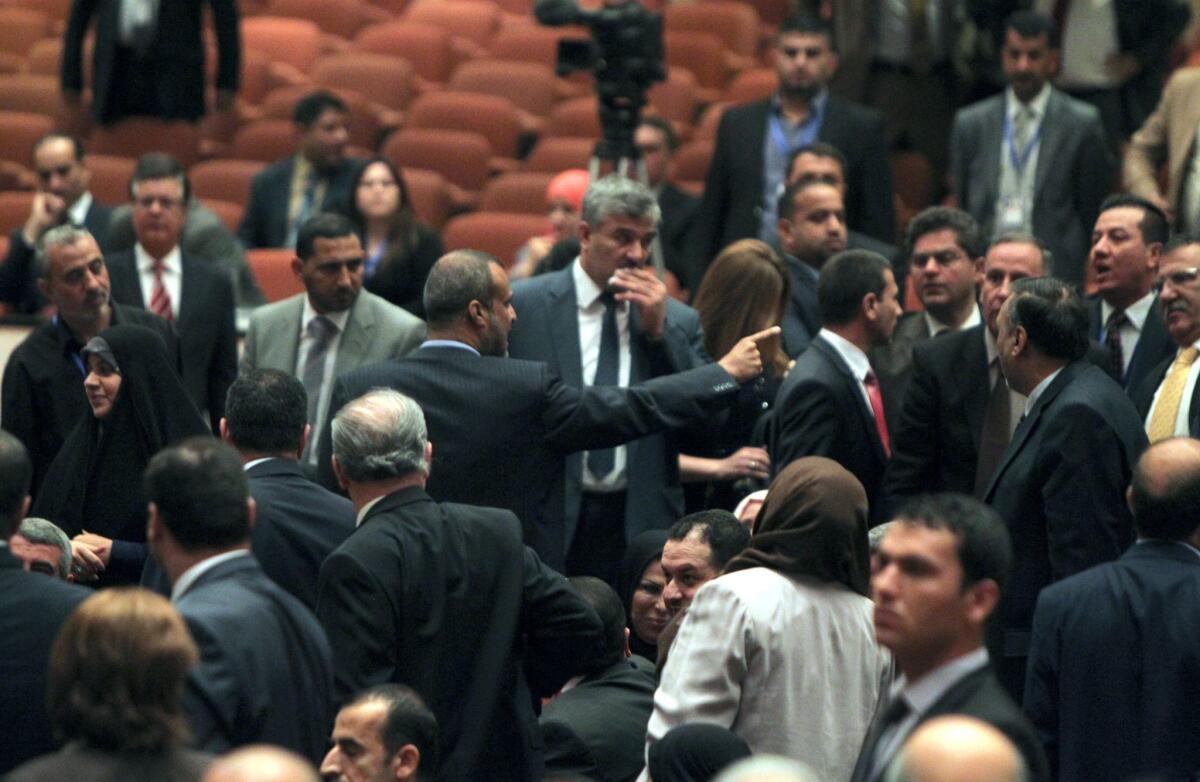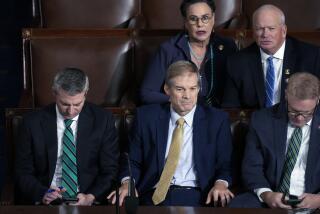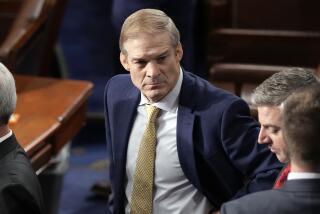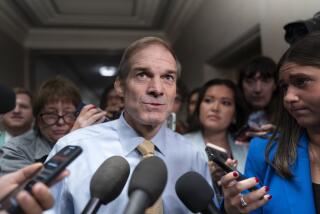Iraqi parliament ends first session in chaos, with no leader chosen

Reporting from Baghdad â Sunni Arab and Kurdish lawmakers walked out of a chaotic opening session of the Iraqi parliament Tuesday after Shiite Muslim leaders failed to nominate a replacement for divisive Prime Minister Nouri Maliki, setting back efforts to build a new coalition government to counter a powerful insurgency.
The session adjourned after less than two hours, illustrating the deepening opposition to Malikiâs bid for a third four-year term. But a fractious Shiite bloc has yet to settle on an alternative candidate despite calls from top Iraqi clerics and U.S. officials to present a united front against the brash Sunni group called the Islamic State, which has declared a caliphate in lands it has seized in Iraq and Syria.
The groupâs leader, Abu Bakr Baghdadi, called on Muslims worldwide to come and build the self-proclaimed caliphate, declaring in a 19-minute audiotape released Tuesday, âMuslims, rush to your state. Yes, it is your state.â The group had called itself the Islamic State of Iraq and Syria before shortening its name during the weekend.
The insurgentsâ military might, growing ambition and global reach have presented a grave crisis for the Iraqi government and brought the country to the brink of collapse. The president of Iraqâs semiautonomous Kurdistan region, which has used the crisis to take control of the oil-rich northern city of Kirkuk, told the BBC in an interview released Tuesday that he would seek a referendum on independence within months.
The United States, among other world powers, strongly opposes the breakup of Iraq, but the country in effect has become partitioned into the insurgent-held north and west, the Kurdish northeast and the government-controlled, mostly Shiite south, including Baghdad.
United Nations officials have reported that June was the deadliest month in Iraq since the height of the sectarian civil war in 2007. More than 2,400 Iraqis were killed and 2,200 injured; the vast majority were civilians. One million Iraqis have fled their homes, the U.N. estimates.
The statistics did not include casualties from the western province of Anbar, where insurgents have seized key towns and border crossings and are locked in clashes with Iraqi security forces. At least 244 civilians were killed and 588 injured there in June, according to provincial health officials.
The top U.N. official in Iraq, Nickolay Mladenov, called the death toll âstaggeringâ and urged Iraqi leaders to reach a political resolution.
âIt is imperative that national leaders work together to foil attempts to destroy the social fabric of Iraqi society,â Mladenov said. âWhat can be achieved through a constitutional political process cannot be achieved through an exclusively military response.â
President Obama, who has sent about 750 U.S. troops to Iraq to assist government forces, has repeatedly called for Iraqi leaders to form an inclusive government, an implicit rebuke of Maliki, a Shiite and erstwhile U.S. ally who has been accused of fostering sectarianism and aggregating power.
In an even bolder statement of impatience, Iraqâs top cleric, Grand Ayatollah Ali Sistani, last week demanded that lawmakers reach consensus on the three top political posts before meeting Tuesday. Under a de facto agreement in the post-Saddam Hussein era, Iraqi Shiites select the prime minister, Kurds select the president and Sunnis select the parliamentary speaker.
But the first parliamentary session since April 30 elections quickly devolved into an unruly mess. After taking their oaths of office, Sunni leaders asked for a break to discuss their nominee for speaker. When it was over, however, Sunni and Kurdish lawmakers did not return to the chamber. Deprived of a quorum, acting Speaker Mahdi Hafidh adjourned the body for at least a week.
Sunni Arab and Kurdish leaders are strongly opposed to Maliki and want to know that he wonât be renominated before presenting their candidates, officials say. After days of meetings, Shiite lawmakers have failed to agree on whether to back Maliki or nominate another contender, such as former Vice President Adel Abdul Mehdi or the onetime CIA ally, Ahmad Chalabi.
âWe have to have a change and to have our demands be met for our people,â Dhafir Ani, a spokesman for the Sunni bloc, told reporters after the session.
Shiites shifted the blame to the Sunni bloc, saying that under the constitution the speaker must be chosen first.
âThey have made the session confused,â said Ali Fayadh, a Shiite lawmaker. âWe donât know what will happen next.â
The delay leaves Maliki in power in a caretaker role despite his weakened political position. The insurgents, who have reportedly forged temporary alliances with other Sunni groups that hold grievances against Maliki, have driven the Iraqi army out of big swaths of the country and seized border crossings into Syria and Jordan.
Yet analysts say Maliki still retains strong support within the fragmented Shiite coalition. With no candidate immediately emerging as a clear alternative, he could remain in power, particularly if the Iraqi security forces begin to wrest some territory back from the militants.
âMaliki has a lot of levers and cards to play.... I wouldnât rule him out just yet,â said Fanar Haddad, a political scientist at the National University of Singaporeâs Middle East Institute.
But the focus on Malikiâs future has distracted attention from the need to build a broad-based government with support from all Iraqi religious and ethnic groups, which experts say is the best hope for turning the tide against the insurgents.
âI never have high hopes for Iraqi politics, but today was honestly a new low,â Haddad said. âIt was clear that the political elite donât see whatâs going on as a national emergency. They just see it as a new variable in their incessant political quarrels and the pursuit of their own political fortunes.â
Special correspondent Hussein Kadhim contributed to this report.For more news from Iraq, follow @SBengali on Twitter
More to Read
Sign up for Essential California
The most important California stories and recommendations in your inbox every morning.
You may occasionally receive promotional content from the Los Angeles Times.











